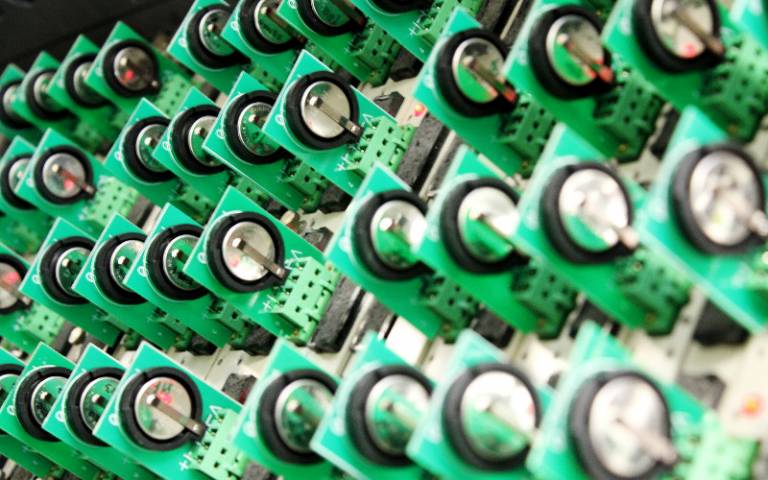Faraday Institution supports UCL Energy Storage research
4 September 2019
The Faraday Institution today announced that it will award up to £55 million to five UK-based consortia to improve batteries used in transport and grid storage – with all five projects featuring UCL involvement.

The new projects join the existing work of the Faraday Institution to benefit the UK in the global race to electrification. This has the dual aims of improving current generation lithium ion batteries, as well as supporting the commercialisation of next-generation batteries.
The Faraday Battery Challenge is part of the government’s Industrial Strategy Challenge Fund (ISCF), overseen by the Department for Business, Energy and Industrial Strategy to help transform the production of batteries for the future of electric vehicles (EVs) in the UK. Business Minister, Nadhim Zahawi, said,
“Today’s funding backs scientists and innovators to collaborate on projects that will deliver a brighter, cleaner future on our roads. We are committed to ensuring that the UK is at the forefront of developing the battery technologies needed to achieve our aim for all cars and vans to be effectively zero emission by 2040.”
The Projects
The projects, which are expected to run over four years, address battery challenges faced by industry with the aim of commercialising new battery technologies and processes. The five projects are:
Alternative cell chemistry beyond lithium ion–LiSTAR, Lithium-Sulfur Technology Accelerator - UCL will lead an effort with six other university partners and seven industrial partners to enable rapid improvements in Lithium-Sulfur (Li-S) technologies. If the potential of Li-S is realised it would take batteries for automotive and other applications beyond the inherent limitations of Li-ion chemistry: Li-S is one of the most attractive alternative technologies available. The Principal Investigator of this consortia is Professor Paul Shearing of UCL. Other consortia partners are Imperial College London, University of Cambridge, University of Nottingham, University of Oxford, University of Southampton and University of Surrey.
Next generation electrode manufacturing–Nextrode - The University of Oxford will lead a consortium of five other university and six industry partners to revolutionise the way electrodes for Li-ion batteries are manufactured. The project’s Principal Investigator is Professor Patrick Grant of the University of Oxford. Other university partners are University of Birmingham, University College London, University of Sheffield, University of Southampton and University of Warwick.
FutureCat – This project has a coordinated approach to cathode chemistry design, development and discovery (including tailored protective coatings and designer interfaces) to deliver cathodes that hold more charge, that are better suited to withstand prolonged cycling and promote ion mobility (increasing battery durability and range and acceleration of the EV) while reducing the dependency of cell manufacturers on cobalt. The project’s Principal Investigator is Professor Serena Corr of the University of Sheffield. Other academic partners are University of Cambridge, University College London, Lancaster University, University of Oxford and the Science and Technology Facilities Council.
CATMAT – This project will place considerable emphasis on understanding the fundamental mechanisms at work within novel cathodes that currently prevent the use of nickel-rich cathode materials (with low or no cobalt) and lithium-rich cathodes. CATMAT will be led by Professor Saiful Islam of the University of Bath. Other academic partners include University of Birmingham, University of Cambridge, University of Liverpool, University of Oxford, University College London and Diamond Light Source.
Next generation sodium ion batteries–NEXGENNA - This project’s aim is to help commercialise a safe sodium ion battery with high performance, low cost and a long cycle life. The relatively low cost of sodium ion batteries makes them an attractive next generation technology, particularly for static energy storage applications and low-cost vehicles. The NEXGENNA project will be led by Professor John Irvine of the University of St Andrews and will have contributions from Lancaster University, University of Cambridge, University College London, University of Sheffield and the Science and Technology Facilities Council.
For more information, you can read the full announcement at the Faraday Institution’s website.
Links:
Image:
Batteries undergoing testing in UCL Chemistry (credit O. Usher)
 Close
Close

